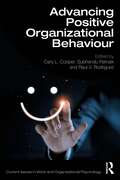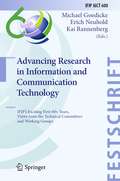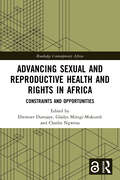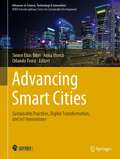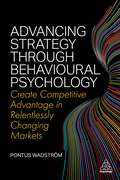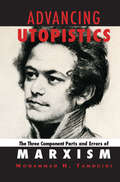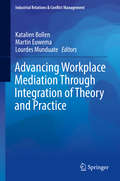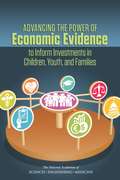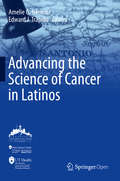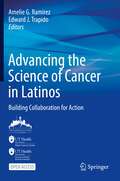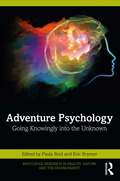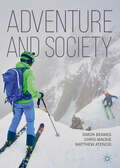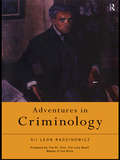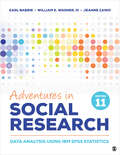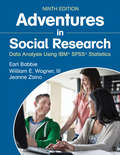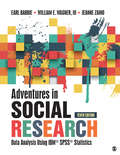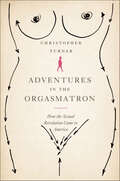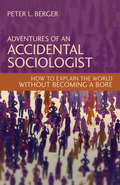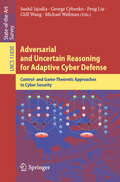- Table View
- List View
Advancing Positive Organizational Behaviour (Current Issues in Work and Organizational Psychology)
by Cary L. Cooper Raul V. Rodriguez Subhendu PatnaikThis comprehensive book provides an overview on the present status of positive organizational behaviour, offering insights on the growing body of research and scholarship, as well as suggestions for future directions in the field. Recent times have seen phenomenal and unprecedented changes in work settings, with many transitioning to hybrid or fully remote arrangements. In addition, unwarranted and unscrupulous application of technology, detrimental ramifications of work stress, and impaired well-being at work are posited to create an unsustainable work environment.Bringing together leading experts from around the world, this collection synthesizes and captures the advancements within the discipline of positive organizational behaviour. It covers such topics as: psychological capital, work engagement interventions, self-efficacy, emotions and positive work behaviour, free will, resilience, work wellbeing, evolutionary psychology and positive workplace, cross-cultural positive organizational behaviour, common-good HRM practices, and methodological advances and challenges in positivity assessments.The book offers a valuable resource for students and scholars of work/organizational psychology, organizational behaviour and applications of positive psychology. It is also a useful reference for organizations looking to understand and implement positive organizational policies in their workplaces.
Advancing Research in Information and Communication Technology: IFIP's Exciting First 60+ Years, Views from the Technical Committees and Working Groups (IFIP Advances in Information and Communication Technology #600)
by Erich Neuhold Kai Rannenberg Michael GoedickeFor 60 years the International Federation for Information Processing (IFIP) has been advancing research in Information and Communication Technology (ICT). This book looks into both past experiences and future perspectives using the core of IFIP's competence, its Technical Committees (TCs) and Working Groups (WGs). Soon after IFIP was founded, it established TCs and related WGs to foster the exchange and development of the scientific and technical aspects of information processing. IFIP TCs are as diverse as the different aspects of information processing, but they share the following aims:To establish and maintain liaison with national and international organizations with allied interests and to foster cooperative action, collaborative research, and information exchange.To identify subjects and priorities for research, to stimulate theoretical work on fundamental issues, and to foster fundamental research which will underpin future development.To provide a forum for professionals with a view to promoting the study, collection, exchange, and dissemination of ideas, information, and research findings and thereby to promote the state of the art.To seek and use the most effective ways of disseminating information about IFIP’s work including the organization of conferences, workshops and symposia and the timely production of relevant publications.To have special regard for the needs of developing countries and to seek practicable ways of working with them.To encourage communication and to promote interaction between users, practitioners, and researchers.To foster interdisciplinary work and – in particular – to collaborate with other Technical Committees and Working Groups. The 17 contributions in this book describe the scientific, technical, and further work in TCs and WGs and in many cases also assess the future consequences of the work’s results. These contributions explore the developments of IFIP and the ICT profession now and over the next 60 years. The contributions are arranged per TC and conclude with the chapter on the IFIP code of ethics and conduct.
Advancing Sexual and Reproductive Health and Rights in Africa: Constraints and Opportunities (ISSN)
by Ebenezer Durojaye Gladys Mirugi-Mukundi Charles NgwenaThis book explores recent developments, constraints and opportunities relating to the advancement of sexual and reproductive health and rights in Africa.Despite many positive developments in relation to sexual and reproductive health in recent years, many Africans still encounter challenges, for instance in poor maternity services, living with HIV, and discrimination on the basis of age, gender, sexual orientation or identity. Covering topics such as abortion, gender identity, adolescent sexuality and homosexuality, the chapters in this book discuss the impact of culture, morality and social beliefs on the enjoyment of sexual and reproductive health and rights across the continent, particularly in relation to vulnerable and marginalized groups. The book also explores the role of litigation, national human rights institutions and regional human rights bodies in advancing the realization of sexual and reproductive health and rights in the region. Throughout, the contributions highlight the relevance of a rights-based framework in addressing topical and contentious issues on sexual and reproductive health and rights within Sub-Saharan Africa.This book will be of interest to researchers of sexuality, civil rights and health in Africa.The Open Access version of this book, available at http://www.taylorfrancis.com/books/e/9781003175049, has been made available under a Creative Commons Attribution-Non Commercial-No Derivatives 4.0 license.
Advancing Sexual and Reproductive Health and Rights in Africa: Constraints and Opportunities (Routledge Contemporary Africa)
by Ebenezer Durojaye, Gladys Mirugi-Mukundi and Charles NgwenaThis book explores recent developments, constraints and opportunities relating to the advancement of sexual and reproductive health and rights in Africa. Despite many positive developments in relation to sexual and reproductive health in recent years, many Africans still encounter challenges, for instance in poor maternity services, living with HIV, and discrimination on the basis of age, gender, sexual orientation or identity. Covering topics such as abortion, gender identity, adolescent sexuality and homosexuality, the chapters in this book discuss the impact of culture, morality and social beliefs on the enjoyment of sexual and reproductive health and rights across the continent, particularly in relation to vulnerable and marginalized groups. The book also explores the role of litigation, national human rights institutions and regional human rights bodies in advancing the realization of sexual and reproductive health and rights in the region. Throughout, the contributions highlight the relevance of a rights-based framework in addressing topical and contentious issues on sexual and reproductive health and rights within Sub-Saharan Africa. This book will be of interest to researchers of sexuality, civil rights and health in Africa.
Advancing Smart Cities: Sustainable Practices, Digital Transformation, and IoT Innovations (Advances in Science, Technology & Innovation)
by Simon Elias Bibri Anna Visvizi Orlando TroisiThis book presents a comprehensive exploration of the transformative journey toward smart cities and the implementation of cutting-edge technologies in urban development. Divided into four distinct parts, it covers a broad range of topics that contribute to sustainable, efficient, and innovative urban living. Encompassing diverse research from IEREK's Future Smart Cities (FSC) conference, it focuses on smart city advancement through sustainable practices, digital transformation, and IoT integration. Covering topics such as smart buildings, urban planning during pandemics, and IoT applications in health care and agriculture, this book shapes the future of urban living. It delves further into opportunities in city regeneration, human-centric smart design, IoT data effectiveness, and more. A valuable resource for academics, researchers, and policymakers, it offers insights into telecommunications, AI, smart manufacturing, and methodologies for urban ecosystem improvement.
Advancing Strategy through Behavioural Psychology: Create Competitive Advantage in Relentlessly Changing Markets
by Pontus WadströmAccelerate strategy and achieve desired results with this guide to understanding and influencing employee behaviour, based on the theory and practice of strategic management, behavioural psychology and change.The realisation of strategy is entirely dependent on employee behaviour, so in order to achieve business results it is vital that managers and leaders develop an understanding of human behaviour. Advancing Strategy through Behavioural Psychology shows that by identifying which behaviours should be measured and encouraged, organizations can succeed in implementing strategies for continuous adaptation in a rapidly changing business environment.Grounded in practitioner experience and academic research, this book argues that to achieve set goals organizations should spend less time planning and sending out instructions and more time on providing feedback on implementation and drawing out key points to be learned. By focusing on behaviour in this way, organizations can create a culture where innovation is encouraged and employees want to contribute to the company's future. Ensure long-term success and seize competitive advantage with this essential guide to identifying the key behaviours which will create business results and what influences them.
Advancing Utopistics: The Three Component Parts and Errors of Marxism
by Mohammad H. TamdgidiMohammad H. Tamdgidi is Assistant Professor of Sociology at the University of Massachusetts Boston. He is the Founding Editor of Human Architecture:Journal of the Sociology of Self-Knowledge.
Advancing Workplace Mediation Through Integration of Theory and Practice (Industrial Relations & Conflict Management)
by Martin Euwema Lourdes Munduate Katalien BollenThis book compares the unique features of workplace mediation to other contexts of mediation, as well as the specific competences each situation requires of the mediator. It covers many important issues related to workplace mediation and discusses interventions by managers, such as conflict coaching and informal mediation. It proposes a new model to assess the effectiveness of mediation, and discusses the impact of legal systems, HRM policies, as well as power structures, and cultural differences. The book takes into account perspectives from multiple disciplines, such as management, business, psychology, law and sociology. It also discusses mediation aspects from a variety of cultural and regional contexts. The book advances knowledge about the application, process and effects of workplace mediation and includes practical tips for scholars, practitioners, mediators and managers to enhance their mediation practice or to foster constructive conflict management in organizations.
Advancing a Circular Economy: A Future without Waste?
by Stephen M JonesThis book explores an escalating modern-day crisis; managing waste in a sustainable way. The central question posed is whether advancing a circular economy provides a way to shift waste management practices towards more sustainable approaches. It begins with an in-depth analysis of the nature of waste management and the prevailing crisis, followed by a discussion about the circular economy in terms of its requirements and the challenges of implementation. The book then moves on to propose a framework that sets out how to establish the policy changes needed to advance a circular approach to waste management. Next, the book outlines complex issues in multilevel systems for advancing a circular economy through examining the contemporary situation in Belgium and Norway. It ends by bringing together the issues revealed in these case studies and draws insights for governments advocating circular approaches. The book will be a valuable resource to scholars, students, practitioners and policy makers interested in developing more sustainable methods of waste management.
Advancing the Power of Economic Evidence to Inform Investments in Children, Youth, and Families
by Engineering Medicine National Academies of SciencesIn recent years, the U.S. federal government has invested approximately $463 billion annually in interventions that affect the overall health and well-being of children and youth, while state and local budgets have devoted almost double that amount. The potential returns on these investments may not only be substantial but also have long-lasting effects for individuals and succeeding generations of their families. Ideally, those tasked with making these investments would have available to them the evidence needed to determine the cost of all required resources to fully implement and sustain each intervention, the expected returns of the investment, to what extent these returns can be measured in monetary or nonmonetary terms, and who will receive the returns and when. As a result of a number of challenges, however, such evidence may not be effectively produced or applied. Low-quality evidence and/or a failure to consider the context in which the evidence will be used may weaken society’s ability to invest wisely, and also reduce future demand for this and other types of evidence. Advancing the Power of Economic Evidence to Inform Investments in Children, Youth, and Families highlights the potential for economic evidence to inform investment decisions for interventions that support the overall health and well-being of children, youth, and families. This report describes challenges to the optimal use of economic evidence, and offers recommendations to stakeholders to promote a lasting improvement in its quality, utility, and use.
Advancing the Science of Cancer in Latinos
by Amelie G. Ramirez Edward J. TrapidoThis open access book gives an overview of the sessions, panel discussions, and outcomes of the Advancing the Science of Cancer in Latinos conference, held in February 2018 in San Antonio, Texas, USA, and hosted by the Mays Cancer Center and the Institute for Health Promotion Research at UT Health San Antonio. Latinos – the largest, youngest, and fastest-growing minority group in the United States – are expected to face a 142% rise in cancer cases in coming years. Although there has been substantial advancement in cancer prevention, screening, diagnosis, and treatment over the past few decades, addressing Latino cancer health disparities has not nearly kept pace with progress. The diverse and dynamic group of speakers and panelists brought together at the Advancing the Science of Cancer in Latinos conference provided in-depth insights as well as progress and actionable goals for Latino-focused basic science research, clinical best practices, community interventions, and what can be done by way of prevention, screening, diagnosis, and treatment of cancer in Latinos. These insights have been translated into the chapters included in this compendium; the chapters summarize the presentations and include current knowledge in the specific topic areas, identified gaps, and top priority areas for future cancer research in Latinos. Topics included among the chapters: Colorectal cancer disparities in Latinos: Genes vs. EnvironmentBreast cancer risk and mortality in women of Latin American originDifferential cancer risk in Latinos: The role of dietOvercoming barriers for Latinos on cancer clinical trialsEs tiempo: Engaging Latinas in cervical cancer researchEmerging policies in U.S. health care Advancing the Science of Cancer in Latinos proves to be an indispensable resource offering key insights into actionable targets for basic science research, suggestions for clinical best practices and community interventions, and novel strategies and advocacy opportunities to reduce health disparities in Latino communities. It will find an engaged audience among researchers, academics, physicians and other healthcare professionals, patient advocates, students, and others with an interest in the broad field of Latino cancer.
Advancing the Science of Cancer in Latinos: Building Collaboration for Action
by Amelie G. Ramirez Edward J. TrapidoThis open access book is a collection of articles based on presentations from the 2020 Advancing the Science of Cancer in Latinos conference that gives an overview of conference outcomes. The vision of the conference has been to unite researchers, scientists, physicians and other healthcare professionals, patient advocates, and students from across the world to discuss research advancements, identify gaps, and develop actionable goals to translate basic research findings into clinical best practices, effective community interventions, and professional training programs to decrease cancer risks and eliminate cancer disparities for Latinos. This conference comes at an especially important time when Latinos – the largest and youngest minority group in the U.S. – are expected to face a 142% rise in cancer cases in the coming years. Disparities continue to impact this population in critical areas: access to preventive and clinical care, changeable risk behaviors, quality of life, and mortality. Each chapter summarizes the presentation and includes current knowledge in the specific topic areas, identified gaps, and opportunities for future research. Topics explored include: Applying an Exposome-Wide (ExWAS) Approach to Latino Cancer DisparitiesSupportive Care Needs and Coping Strategies Used by Latino Men Cancer SurvivorsOptimizing Engagement of the Latino Community in Cancer ResearchLatino Population Growth and the Changing Demography of CancerImplementation Science to Enhance the Value of Cancer Research in Latinos A Strength-Based Approach to Cancer Prevention in LatinxsOvercoming Clinical Research Disparities by Advancing Inclusive Research Advancing the Science of Cancer in Latinos: Building Collaboration for Action will appeal to a wide readership due to its comprehensive coverage of topics ranging from basic science and community prevention research to clinical practice to policy. The book is an essential resource for physicians and other medical professionals, researchers, scientists, academicians, patient advocates, and students. It also will appeal to policy-makers, NCI-designated cancer centers, academic centers, state health departments, and community organizations.
Adventure Psychology: Going Knowingly into the Unknown (Routledge Research in Health, Nature and the Environment)
by Eric Brymer Paula ReidIn recent years a new set of psychological principles has emerged from research investigating adventure and adventurous activities. Adventure involves a special type of physical activity in natural contexts where participants voluntarily participate in experiences where the environment and activity are challenging, perhaps dangerous and potentially life threatening. To go on an adventure is to participate in an enduring event requiring sustainable effort, where effective performance is measured not only by success but also by survival. This book brings together the emerging literature in ‘Adventure Psychology’ that supports enduring performance and wellbeing. The first section examines sustaining performance and wellbeing. The second section studies the transformative aspect of adventure. Adventure Psychology is of use in everyday life and the techniques and understandings can help people and business prepare for the future. This book will help us all thrive despite adversity, volatility and uncertainty. Written for trainers, educators, researchers and students of sports, performance and organisational psychology as well as adventurers and endurance athletes, Adventure Psychology is designed to meet the needs of specialists across a variety of fields but importantly also to be accessible and applicable for those wanting to live life fully — to realise our full potential.
Adventure and Society
by Simon Beames Chris Mackie Matthew AtencioThis book provides a broad overview of the ways in which ‘adventurous practices’ influence, and are influenced by, the world around them. The concept of adventure is one that is too often tackled within subject silos of philosophy, education, tourism, or leisure. While much of the analysis is strong, there is little cross-pollination between disciplines. Adventure & Society pulls together the threads of these discourses into one coherent treatment of the term ‘adventure’ and the role that it plays in human social life of the 21st century. It explores how these practices can be considered more deeply through theoretical discourses of capitalism, identity construction, technology and social media, risk-taking, personal development, equalities, and sustainability. As such, the book speaks to a broad audience of undergraduate and postgraduate students across diverse subject areas, and aims to be an accessible starting point for deeper inquiry.
Adventures In The Human Spirit (Third Edition)
by Philip E. BishopExceptionally student-friendly, extensively illustrated, and engagingly thought-provoking, this one-volume historical survey of the humanities is accessible--and inviting--to readers with little background in the arts and humanities. Carefully balanced among the major arts, philosophy, and religion and finely focused on selected principal events, styles, movements, and figures, it brings the past to life by including authentic documents from daily life, comparative global perspectives, and examples from literature, philosophy, music--including the contributions of women and minority artists. For individuals waiting to discover the humanities' rich connections to their own
Adventures in Criminology
by Sir Leon RadzinowiczSir Leon Radzinowicz is one of the key figures in the development of criminology in the twentieth century. This account of the development of criminology intertwines his personal narrative as a criminologist with the progression of criminology itself. His experience gained from a career which has spanned 70 years since the 1920s, offers a profound overview of how the understanding of crime and criminals, of criminal justice systems and penology has changed, and of the tensions and dilemmas these pose for democratic societies.
Adventures in Social Research: Data Analysis Using IBM SPSS Statistics
by Earl R. Babbie Jeanne S. Zaino William E. WagnerThis text provides a practical, hands-on introduction to data conceptualization, measurement, and association through active learning. Students get step-by-step instruction on data analysis using the latest version of SPSS and the most current General Social Survey data. The text starts with an introduction to computerized data analysis and the social research process, then walks users through univariate, bivariate, and multivariate analysis using SPSS. The book contains applications from across the social sciences—sociology, political science, social work, criminal justice, health—so it can be used in courses offered in any of these departments. The Eleventh Edition uses the latest general Social Survey (GSS) data, and the latest available version of SPSS. The GSS datasets now offer additional variables for more possibilities in the demonstrations and exercises within each chapter.
Adventures in Social Research: Data Analysis Using IBM SPSS Statistics
by Earl R. Babbie Jeanne S. Zaino William E. WagnerThis text provides a practical, hands-on introduction to data conceptualization, measurement, and association through active learning. Students get step-by-step instruction on data analysis using the latest version of SPSS and the most current General Social Survey data. The text starts with an introduction to computerized data analysis and the social research process, then walks users through univariate, bivariate, and multivariate analysis using SPSS. The book contains applications from across the social sciences—sociology, political science, social work, criminal justice, health—so it can be used in courses offered in any of these departments. The Eleventh Edition uses the latest general Social Survey (GSS) data, and the latest available version of SPSS. The GSS datasets now offer additional variables for more possibilities in the demonstrations and exercises within each chapter.
Adventures in Social Research: Data Analysis Using IBM® SPSS® Statistics
by Earl R. Babbie Dr William E. Wagner Jeanne S. ZainoWritten by esteemed social science research authors Earl R. Babbie, William E. Wagner, and Jeanne Zaino, Adventures in Social Research: Data Analysis Using IBM® SPSS® Statistics, Ninth Edition encourages students to practice SPSS as they read about it, providing a practical, hands-on introduction to conceptualization, measurement, and association through active learning. This fully revised workbook will guide students through step-by-step instruction on data analysis using the latest version of SPSS and the most up to date General Social Survey data. Arranged to parallel most introductory research methods texts, this text starts with an introduction to computerized data analysis and the social research process, then takes readers step-by-step through univariate, bivariate, and multivariate analysis using SPSS Statistics. In this revised edition, active and collaborative learning will be emphasized as students engage in a series of practical investigative exercises.
Adventures in Social Research: Data Analysis Using IBM® SPSS® Statistics
by Earl R. Babbie Dr William E. Wagner Jeanne S. ZainoWritten by esteemed social science research authors Earl R. Babbie, William E. Wagner, and Jeanne Zaino, Adventures in Social Research: Data Analysis Using IBM® SPSS® Statistics, Ninth Edition encourages students to practice SPSS as they read about it, providing a practical, hands-on introduction to conceptualization, measurement, and association through active learning. This fully revised workbook will guide students through step-by-step instruction on data analysis using the latest version of SPSS and the most up to date General Social Survey data. Arranged to parallel most introductory research methods texts, this text starts with an introduction to computerized data analysis and the social research process, then takes readers step-by-step through univariate, bivariate, and multivariate analysis using SPSS Statistics. In this revised edition, active and collaborative learning will be emphasized as students engage in a series of practical investigative exercises.
Adventures in Social Research: Data Analysis Using IBM® SPSS® Statistics
by Earl R. Babbie Dr William E. Wagner Jeanne S. ZainoInspire students to pursue their own adventures in social research with this practical, hands-on introduction to data conceptualization, measurement, and association through active learning. Adventures in Social Research: Data Analysis Using IBM® SPSS® Statistics from Earl Babbie, William E. Wagner, III, and Jeanne Zaino offers a practical, hands-on introduction to the logic of social science research for students in many disciplines. The fully revised Tenth Edition offers step-by-step instruction on data analysis using the latest version (24.0) of SPSS and current data from the General Social Survey. Organized to parallel most introductory research methods texts, this text starts with an introduction to computerized data analysis and the social research process, then takes readers step-by-step through univariate, bivariate, and multivariate analysis using SPSS Statistics. The range of topics, from beginning to advanced, make Adventures in Social Research appropriate for both undergraduate and graduate courses.
Adventures in Social Research: Data Analysis Using IBM® SPSS® Statistics
by Earl R. Babbie Dr William E. Wagner Jeanne S. ZainoInspire students to pursue their own adventures in social research with this practical, hands-on introduction to data conceptualization, measurement, and association through active learning. Adventures in Social Research: Data Analysis Using IBM® SPSS® Statistics from Earl Babbie, William E. Wagner, III, and Jeanne Zaino offers a practical, hands-on introduction to the logic of social science research for students in many disciplines. The fully revised Tenth Edition offers step-by-step instruction on data analysis using the latest version (24.0) of SPSS and current data from the General Social Survey. Organized to parallel most introductory research methods texts, this text starts with an introduction to computerized data analysis and the social research process, then takes readers step-by-step through univariate, bivariate, and multivariate analysis using SPSS Statistics. The range of topics, from beginning to advanced, make Adventures in Social Research appropriate for both undergraduate and graduate courses.
Adventures in the Orgasmatron: How the Sexual Revolution Came to America
by Christopher TurnerOne of The Economist's 2011 Books of the Year A Boston Globe Best Nonfiction Book of 2011 Well before the 1960s, a sexual revolution was under way in America, led by expatriated European thinkers who saw a vast country ripe for liberation. In Adventures in the Orgasmatron, Christopher Turner tells the revolution's story—an illuminating, thrilling, often bizarre story of sex and science, ecstasy and repression. Central to the narrative is the orgone box—a tall, slender construction of wood, metal, and steel wool. A person who sat in the box, it was thought, could elevate his or her "orgastic potential." The box was the invention of Wilhelm Reich, an outrider psychoanalyst who faced a federal ban on the orgone box, an FBI investigation, a fraught encounter with Einstein, and bouts of paranoia. In Turner's vivid account, Reich's efforts anticipated those of Alfred Kinsey, Herbert Marcuse, and other prominent thinkers—efforts that brought about a transformation of Western views of sexuality in ways even the thinkers themselves could not have imagined.
Adventures of an Accidental Sociologist
by Peter L. BergerPeter L. Berger is arguably the best-known American sociologist living today. Since the 1960s he has been publishing books on many facets of the American social scene, and several are now considered classics. So it may be hard to believe Professor Berger's description of himself as an "accidental sociologist." But that in fact accurately describes how he stumbled into sociology. In this witty, intellectually stimulating memoir, Berger explains not only how he became a social scientist, but the many adventures that this calling has led to. Rather than writing an autobiography, he focuses on the main intellectual issues that motivated his work and the various people and situations he encountered in the course of his career. Full of memorable vignettes and colorful characters depicted in a lively narrative often laced with humor, Berger's memoir conveys the excitement that a study of social life can bring. The first part of the book describes Berger's initiation into sociology through the New School for Social Research, "a European enclave in the midst of Greenwich Village bohemia." Berger was first a student at the New School and later a young professor amidst a clique of like-minded individuals. There he published The Social Construction of Reality (with colleague Thomas Luckmann), one of his most successful books, followed by The Sacred Canopy on the sociology of religion, also still widely cited. The book covers Berger's experience as a "globe-trekking sociologist" including trips to Mexico, where he studied approaches to Third World poverty; to East Asia, where he discovered the potential of capitalism to improve social conditions; and to South Africa, where he chaired an international study group on the future of post-Apartheid society. Berger then tells about his role as the director of a research center at Boston University. For over two decades he and his colleagues have been tackling such important issues as globalization, the secularization of Europe, and the ongoing dialectic between relativism and fundamentalism in contemporary culture.What comes across throughout is Berger's boundless curiosity with the many ways in which people interact in society. This book offers longtime Berger readers as well as newcomers to sociology proof that the sociologist's attempt to explain the world is anything but boring.
Adversarial and Uncertain Reasoning for Adaptive Cyber Defense: Control- and Game-Theoretic Approaches to Cyber Security (Lecture Notes in Computer Science #11830)
by Sushil Jajodia Cliff Wang Peng Liu George Cybenko Michael WellmanToday’s cyber defenses are largely static allowing adversaries to pre-plan their attacks. In response to this situation, researchers have started to investigate various methods that make networked information systems less homogeneous and less predictable by engineering systems that have homogeneous functionalities but randomized manifestations. The 10 papers included in this State-of-the Art Survey present recent advances made by a large team of researchers working on the same US Department of Defense Multidisciplinary University Research Initiative (MURI) project during 2013-2019. This project has developed a new class of technologies called Adaptive Cyber Defense (ACD) by building on two active but heretofore separate research areas: Adaptation Techniques (AT) and Adversarial Reasoning (AR). AT methods introduce diversity and uncertainty into networks, applications, and hosts. AR combines machine learning, behavioral science, operations research, control theory, and game theory to address the goal of computing effective strategies in dynamic, adversarial environments.
